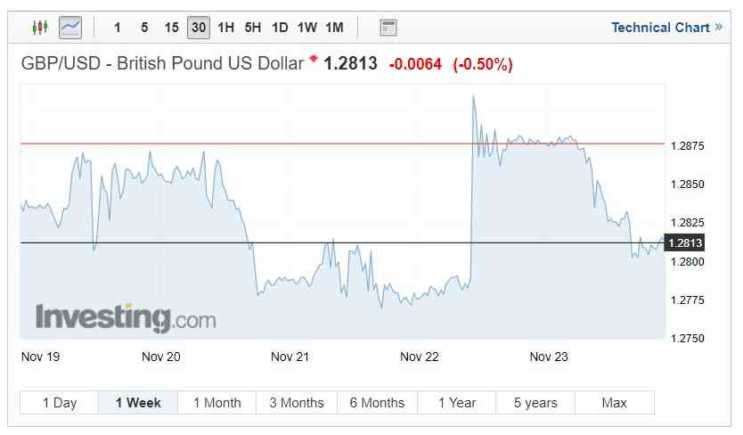The Pound recovered reasonably well this week despite, the undoubtable turmoil the UK Brexit deal now faces. Whilst support for Mays deal would appear minimal the PM plans a campaign run shortly in order to gain support for the agreement.

It is believed that the future union between the UK and EU is agreed, this collaboration is believed to include a trade agreement and security collaboration.
EU and UK future trade agreement
The UK and EU declaration which is planned to be signed by both parties at this weekend’s summit. The 26-page document which sets out future aspirations for the UK and Europe has hailed as ‘right for the whole of the UK’ but has naturally faced criticism by her adversaries and those in her own party.
The document unlike the withdrawal agreement published last week isn’t legally binding and therefore will have to be considered a ‘gentleman’s agreement’ rather than a structured collaboration and plan. Essentially risking the possibility of either the UK or EU not committing to certain parts of the agreement.
The Labour leader Jeremy Corbyn dubbed the declaration as’’26 pages of waffle’’ whilst the ex-foreign secretary stated that the declaration made ‘’a complete nonsense of Brexit’’.
May heads to Brussels
Prime Minister May will fly to Brussels over the weekend to seal her Brexit deal, the weekend will undoubtedly be challenging, however, the real fight will begin on her return. Its understood that roughly 85 of 315 conservative party members are willing to reject the proposed draft. Meaning that May faces an uphill struggle to convince an equivalent amount of rebellious Labour MP’s in order to get the bill past parliament.
May who will meet with Jean Claude Juncker over the weekend intends to formally agree on the draft withdrawal agreement and political declaration before the EU summit. Whilst it’s all but confirmed that the EU 27 support the two documents, Spain has stated that the EU summit will not go ahead unless it has a say in the future of Gibraltar’s sovereignty; essentially allowing Madrid to have a say in future decisions. The initial Brexit draft featured the concession; however, they don’t feature on the final draft, therefore, Spain could possibly veto the agreement.
How might Brexit be concluded?
Whilst a deal with the EU seems all but struck a very rocky road lays ahead, the PM has no way near the required support need to push a deal through Parliament. Key members of the Tory party remain hell-bent on dethroning May. Therefore, despite two years of negotiating the UK and EU find themselves at a crossroad where a potential deal has been heavily criticised, lack support and is unlikely to formalise. We are therefore left with a handful of potential outcomes.
Delayed due to current lack of support
In May last year, Prime Minister May attempted to gain resolute power by holding a snap general election. Her rationale to gain support both for the party and clarify truly as to weather Brexit had support. Her plan failed unequivocally, and the party found themselves trying to cobble an alliance together in order to retain a grasp on power. The Tories lost the majority and ended up creating a minority government with the DUP who now offer little support for the Brexit plan, despite agreeing on a side deal for a £1billion pound investment into Northern Ireland.
May could, therefore, decide to delay Brexit and head back to the UK in order to refine the agreement and gain the 320 votes needed to get Brexit passed. Currently, this would appear a mathematical improbability at best both due to the number of Tory seats, the amount of Hard Brexit Tory members and the evaporation of support from the DUP. She could, however, play hardball with the EU, potentially gains further concessions and squeeze a deal that is acceptable to parliament.
Leadership challenge
Another possible outcome, if the deal was voted down would be a leadership challenge. Currently, 26 Conservative MP’s have submitted letters of no confidence against PM May. If the vote on the deal shows a very weak level of support many more will be sure to follow. Jacob Rees-Mogg attempted a coup last week, his attempts to instigate further letters of no support have proved both divisive and poorly judged. He could, however, push harder if the draft is voted down.
The real issue the Tory party finds itself facing is that there are very few viable candidates. Boris Johnson’s advances have been marked down as self-promotion and whilst still, a prominent Hard Brexiteer Johnson hasn’t thrown his name in the hat. Mogg although keen on the hard Brexit route hasn’t endorsed any candidate formally and seems unlikely to want to take charge himself. If May was replaced this would mean the UK would face another election and it’s very likely the party could lose. Political instability would prove a disaster for financial markets and the pound would depreciate heavily.
Second referendum
The possibility of the UK holding a second referendum gains momentum by the hour. Whilst much of the nation were disillusioned by the outcome of the first referendum, the handling and progress of negotiations will only have added to the sentiment. In a recent survey spearheaded by channel 4, the channel’s vote suggests that remain would now have 8% lead.
Whilst May has dismissed calls for a second referendum her hand might be forced if attempts to push through the draft proposal meet a stone wall.
The people’s vote has gained traction throughout the UK with the online petition gaining over 334,000 signatures. Whilst a further referendum would potentially create as much uncertainty in financial markets as leadership challenges and elections a remain outcome would see a sharp rise in Pound dollar and GBP in general.
There remains such a strong argument for a referendum due to both the disorganisation of the negotiation but also the fact that much of the rationale behind a left vote has now been proved to be fiction.
No Deal/Hard Brexit
May is clearly vying for a soft Brexit and wants the UK to remain close to the EU if not within the EU. This rationale has been supported by the governor of the BOE who openly backed the bill and warned of the implications for the UK economy if a No deal or Hard Brexit scenario materialised.
Warning against a Hard Brexit route, Carney said that the UK economy could be plunged into scenario not seen since the 1970s. The 1970s marked the winter discontent went a host of western nations were plunged into recession by an oil crisis.
If May had no further solution on concessions a hard Brexit would remain her only outcome. Although one would imagine support would be limited if this was the only option the UK would leave the EU under a cloud and revert back to WTO trade rules. A Hard Brexit would also see the UK’s Debt be subject to inevitably higher levels of interest. The pound would drop dramatically and general confidence in UK financial markets would be limited.
Pound/Dollar exchange rate gains following UK and EU draft
The pound dollar exchange rates enjoyed a good level of traction in the final days of the trading week. The news surrounding the UK and EU draft agreement boosted sterling with the pair rising from 1.2790 to 1.2908, nearly a two-week high. The gains, however, have been traded off as investors took profit.
The issues with news motivated currency movements is that although positive for the overall picture, any proposed draft needs approval in parliament and support just doesn’t appear to be there. PM May and the EU might have agreed to terms but to be formalised 319 others will need to also be for the agreement. Investors and pound sellers should be conscious of this, whilst the parliament vote is scheduled for early December don’t expect the Pound to enjoy sustainable gains until then, however after the vote, if as anticipated the outcome of the draft approval is negative, expect heavy pound losses across many currencies.
